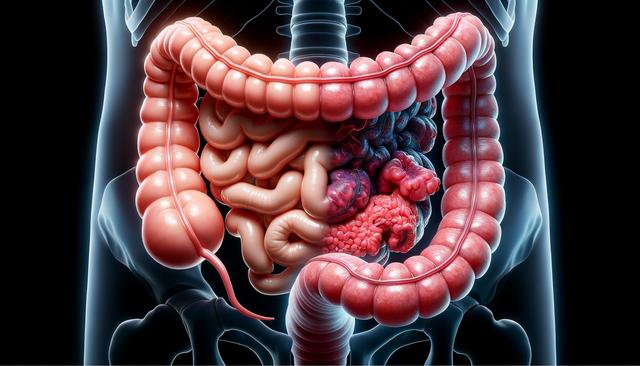Colitis Diet: Avoid These Foods

Understanding Ulcerative Colitis and Its Impact
Ulcerative colitis is a type of inflammatory bowel disease (IBD) that causes inflammation and ulcers in the lining of the colon and rectum. The condition often leads to symptoms such as abdominal pain, frequent diarrhea, rectal bleeding, and an urgent need to defecate. While the exact cause is not fully understood, it is believed to result from an inappropriate immune response in genetically predisposed individuals. Environmental factors, including diet and stress, may also play a role in triggering or worsening symptoms. Because the symptoms can be unpredictable and vary in intensity, managing the disease often requires a comprehensive approach that includes medication, lifestyle changes, and dietary adjustments.
Living with ulcerative colitis can significantly impact quality of life, particularly when flare-ups occur. During these periods, inflammation intensifies, and symptoms become more severe, making it essential to identify and avoid potential triggers. One of the most influential and controllable factors is diet. Individuals with ulcerative colitis may find that certain foods exacerbate their symptoms, while others may help maintain remission. Understanding which foods to avoid is an important step in managing the disease effectively.
Colitis Diet: Avoid These Foods
When dealing with ulcerative colitis, not all foods are created equal. Some can irritate the digestive tract and lead to inflammation or discomfort, especially during flare-ups. While dietary triggers can vary from person to person, several common culprits are known to worsen symptoms for many people. These include:
- High-fiber foods such as raw fruits, vegetables, and whole grains, which can be hard to digest during flare-ups
- Dairy products, particularly for those with lactose intolerance
- Spicy foods, which may irritate the lining of the colon
- Caffeinated and carbonated beverages, which can increase bowel activity
- Alcohol, which may exacerbate inflammation
- Fatty or fried foods that are difficult to process
It’s important to note that dietary needs can differ based on whether an individual is experiencing a flare-up or is in remission. During flare-ups, a low-residue or low-fiber diet may help reduce the frequency of bowel movements and ease symptoms. Working with a healthcare provider or registered dietitian can help tailor a diet plan to individual needs and tolerances.
Foods That May Support Digestive Calm
Just as some foods can aggravate ulcerative colitis symptoms, others may help soothe the digestive tract and support overall gut health. While no specific food can cure ulcerative colitis, certain choices are generally well-tolerated and may contribute to symptom management. These include:
- Cooked vegetables such as carrots, zucchini, and squash, which are easier to digest than raw options
- Lean protein sources like skinless poultry, fish, and eggs
- Refined grains such as white rice or pasta, which are gentler on the colon during flare-ups
- Fermented foods like yogurt (if tolerated), kefir, or sauerkraut, which may support gut microbiome balance
- Hydrating beverages such as water and herbal teas
It’s important to introduce new foods gradually and observe how the body responds. Keeping a food diary can be a helpful tool in identifying patterns and potential triggers. In remission periods, some individuals may tolerate a broader range of foods, including moderate amounts of fiber and healthy fats. However, changes should always be made cautiously and with medical guidance.
The Role of Nutritional Supplements
Due to nutrient malabsorption and dietary restrictions, individuals with ulcerative colitis may be at risk for nutrient deficiencies. Common deficiencies include iron, calcium, vitamin D, vitamin B12, and folic acid. These can result from chronic inflammation, blood loss, or limited intake of certain food groups. Nutritional supplements may play a supportive role in maintaining overall health, especially during prolonged flare-ups or when dietary intake is limited.
Before starting any supplements, it’s essential to consult with a healthcare provider. Some supplements, particularly those in high doses or with added ingredients, may not be suitable and could even worsen symptoms. For example, iron supplements can sometimes cause gastrointestinal discomfort. In such cases, intravenous iron or dietary adjustments may be recommended instead. A personalized approach is key to ensuring that nutritional needs are met without aggravating the condition.
Long-Term Dietary Strategies and Lifestyle Considerations
Managing ulcerative colitis is not just about avoiding certain foods; it involves developing sustainable dietary habits and lifestyle adjustments that support long-term well-being. A balanced, nutrient-rich diet tailored to individual tolerance levels can help minimize flare-ups and improve energy levels. Incorporating regular meals, staying hydrated, and avoiding excessive intake of processed or fast food are general practices that benefit most individuals with this condition.
In addition to diet, stress management plays a crucial role in managing ulcerative colitis. Stress can trigger or worsen symptoms, so incorporating relaxation techniques such as yoga, meditation, or regular physical activity can be beneficial. Adequate sleep and maintaining a consistent routine also contribute to overall digestive health. Since ulcerative colitis varies widely in how it affects individuals, maintaining open communication with a healthcare team and seeking support from patient communities can provide valuable insight and encouragement.
Conclusion: Navigating Diet with Ulcerative Colitis
For those living with ulcerative colitis, understanding and managing dietary triggers is a critical part of maintaining quality of life. Avoiding certain foods—particularly those high in fiber, fat, or irritants—can help reduce the frequency and severity of flare-ups. Equally important is identifying foods that support digestion and provide essential nutrients. By working with healthcare professionals and paying close attention to individual responses, it’s possible to create a dietary strategy that supports both digestive comfort and overall health. With a thoughtful approach, individuals can take meaningful steps toward managing symptoms and living well with ulcerative colitis.
